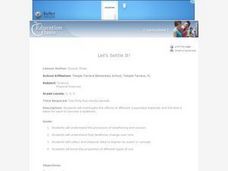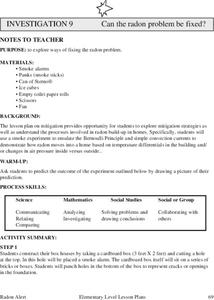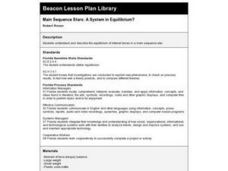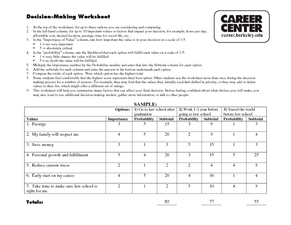Curated OER
Let's Settle It!
Students investigate and record data about sedimentation rates. They make a sedimentation bottle using aquarium gravel, sand and potting soil. They discuss the sedimentation rates that they see in their bottles.
Curated OER
Lung Model
Learners create a simulated lung to explore its functions as part of the respiratory system.
Curated OER
Lots of Labels
Students examine labels in the classroom to connect the written word with a message. They discover photographs of local buildings and their purpose. They also practice the classroom rules based on the labels.
Curated OER
Green Leaves
Third graders, after having conducted one experiment three times, record their observations results in a chart. They predict what hidden colors they believe that a leaf holds. Students record their predictions in their science note books...
Curated OER
Can The Radon Problem Be Fixed?
Young scholars participate in lab activities in which they examine the radon level in homes. They demonstrate through convection currents how radon moves through a home based on temperature. They predict what they believe will occur...
Curated OER
How Might Radon Affect Me?
Students participate in an experiment in which they discover the relationship between the lungs and radon. They identify the helpful and harmful aspects of radiation. They also research any illnesses related to exposure to radon gas.
Curated OER
Wetlands Project
Students discover how wetlands filter out contaminants before they can reach other bodies of water. In groups, they design and build a model of a stormwater wetland. They test the water quality and inform their classmates about the...
Curated OER
Pollution Solutions
Young scholars participate in a hands-on activity to determine how water is polluted and investigate steps in how to treat water. Students try to produce the cleanest water possible using the materials provided.
Curated OER
Cuban Missile Crisis
Seventh graders explore, analyze and study all the various aspects that happened concerning the Cuban Missile Crisis. They assess documents from the Cuban Missile Crisis and make decisions about what the United States should do based on...
Curated OER
Main Sequence Stars: A System in Equilibrium?
Fourth graders study the equilibrium of internal forces in a main sequence star.
Curated OER
Dino Fossils
Primary paleontologists discover the information they can gather from examining fossils. They place pictures in the correct sequence showing how an animal becomes a fossil. They discuss which sediments would preserve fossils better as well.
Curated OER
Create a Full-Scale Layout of the International Space Station
Students work together to convert scale dimensions to determine the true size of the International Space Station. They create a full-scale outline of the station. They share their layout with the class.
Curated OER
Paper Packaging Design
Students discuss the relationship between technology and manufacturing. They then use their ideas to construct a model of a paper board carton package. Next they view a PowerPoint presentation to learn about the history of packaging...
Curated OER
ESTIMATION
Pupils practice estimating and counting and using a ruler to measure distance.
Curated OER
Karst Topography
Students observe a movie about karst topography over the Internet and note nonpoint source pollution. They discuss ways to manage pollution and their experiences with any polltion sources.
Curated OER
Adding More Than Two Numbers
In this adding more than two numbers worksheet, students, working with a partner, calculate the answers to eleven addition equations.
Curated OER
Decision Making Worksheet: Careers
In this careers worksheet, learners use the decision making chart to list and compare three possible career choices. Students use the provided formulas to help narrow their career choices.
Curated OER
Terrariums for Project Pals
Students identify the components needed by plants to survive in the terrarium. In this biology lesson, students build their own terrariums using materials available. They present their project in class.
Curated OER
Treasure of the Silk Roads
Students generate world maps that act as creative writing prompts. The prompts reflect on the cultures and history of the past through their own experiences. Students create an original writing sample.
Curated OER
My Water's Place in Space
Students discover their absolute and relative place in space relative to water and create a book sequencing that space from most specific to most general.
Curated OER
Who Am I? A Look at Portraits
Students examine a variety of portrait examples in order to visualize how information is portrayed in the pictures. They create a portrait.
Curated OER
Density Stratification and Ocean Circulation
Students examine how circulation currents of the ocean. They use a tub of hot and cold water to demonstrate the currents. They discover how salinity and temperature of water affect its movement.
Curated OER
Determine Soil Particle Size
Students examine various soil samples in groups. Using the samples, they identify the characteristics of them and calculate percolation and infiltration rates. They use this information to discover why some species can survive in one...

























